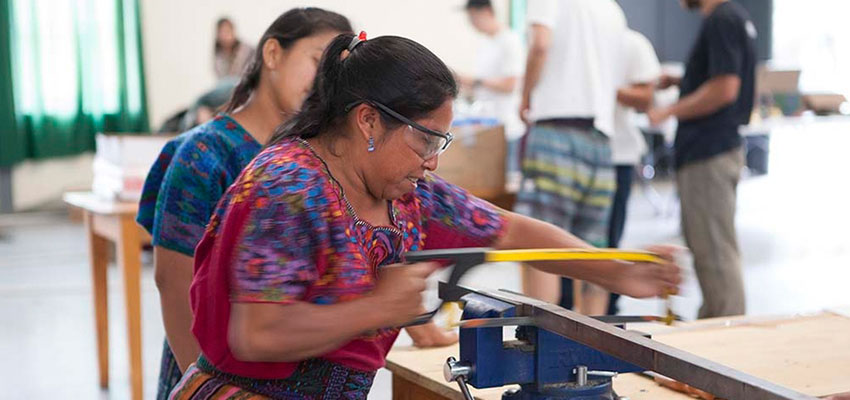
The award will support development-oriented research through a Center for Innovation and Technology at Universidad del Valle de Guatemala.
MIT has received a $15 million award from the United States Agency for International Development (USAID), announced today at a ceremony in Guatemala City. USAID granted the award to fund the Achieving Sustainable Partnerships in Innovation, Research, and Entrepreneurship (ASPIRE) program.
The award will support a collaboration between MIT, Universidad del Valle de Guatemala (UVG), and the Guatemalan Exporters Association (AGEXPORT) over the next five years to advance a Center for Innovation and Technology Network based at UVG. This network will operate with a center on UVG’s campus in Guatemala City and additional centers at the two campuses serving more rural communities, including a campus in the Western Highlands, where the majority of Guatemala’s indigenous community is located and where poverty and migration pressures are acute. The network will also serve to connect researchers at Latin American universities with researchers at MIT to collaboratively seek innovative solutions to regional development challenges.
The ASPIRE project in Guatemala will become a regional innovation hub, collaborating with other centers across Central America through training, exchanges, and projects funded by the USAID grant. The centers will be part of a larger USAID program known as Building Research and Innovation for Development, Generating Evidence, and Training — or BRIDGE-Train — which supports partnerships between higher education institutions in the United States and in low- to middle-income countries.
“USAID works strategically with institutions of higher education to solve critical challenges,” said Maggie Linak, USAID senior scientist and program officer, and the designated agreement officer’s representative for the ASPIRE project, in a statement. “Higher-education partnerships can build and strengthen scientific research capacity to fill gaps in knowledge and empower governments, civil society, and the private sector in our partner countries to address their own development challenges.”
The ASPIRE project will have leadership from all three main collaborators — MIT, UVG, and AGEXPORT. AT MIT, the program will be led by Professor Daniel Frey of the Department of Mechanical Engineering, and from MIT D-Lab, Associate Director for Research Kendra Leith and Research Scientist Elizabeth Hoffecker, a research scientist. The leadership team at Universidad del Valle de Guatemala is comprised of Mónica Stein Coronado, vice-rector for research, partnership, and collaboration; and Victor Ayerdi, head of the Mechanical Engineering Department. At AGEXPORT, Moisés Mérida, director of partnerships for development, will lead that organization’s collaborative effort.
Over the next five years, the ASPIRE team will employ a co-creative, community-engaged approach to research, teaching, innovation, entrepreneurship support, and collaborative activities informed by MIT’s approach to research-driven innovation ecosystem development. The expected result is a Center for Innovation and Technology Network that is a world-class, regionally relevant, replicable model for the ways in which Latin American higher education institutions can address local and regional development priorities.
“Higher education institutions have historically been engines of economic development and that trend seems to be accelerating,” Frey says. “The mindset of modern universities is to collaborate broadly and share knowledge openly. We’re committed to this participatory approach as a means to sustainable design solutions.”
“We’ll bring MIT and UVG researchers together to solve problems using a ‘mens-et-manus’ approach, giving students and researchers the opportunity to apply what they are learning to real-world challenges, such as those identified by AGEXPORT in their work at the community level,” comments Leith of MIT D-Lab.
Guatemala has a substantially agricultural-based economy, and, as such, its economic future is strongly determined by the prosperity of its farmers and the sustainability and resilience of its farming systems. Therefore, the center will collaborate with the private nonprofit AGEXPORT, a trade association that promotes Guatemalan exports and emphasizes the importance of incorporating micro, small, and medium enterprises into the export value chains.
“One of our priorities is to bring university researchers, businesses of all sizes, smallholder farmers, and other stakeholders together to address high priority areas for inclusive innovation, such as opportunities to add value to Guatemala’s agricultural exports,” notes MIT D-Lab’s Hoffecker.
The program’s methodology leverages existing infrastructure and capacity at UVG and adds high-quality, development-oriented research, innovation, and entrepreneurship that have been used successfully at MIT over the past decade. The effort first seeks transformation within UVG, strengthening the enabling conditions for these changes at the central campus, and then replicates the strategies, methods, and program model at the UVG rural campuses, where these approaches are still nascent.
“Guatemala is a country where so many positive developments are emerging but where much more can be done,” notes Mónica Stein Coronado of UVG.
Throughout the five-year collaboration, there will also be a special emphasis on involving women and indigenous people in developing technology-related solutions.
“We’ll be working with organizations throughout the country that support women and indigenous people and we feel sure they can participate equally in education, research, and entrepreneurship,” UVG’s Ayerdi says.
More Information
Contact
Kendra Leith, MIT D-Lab Associate Director of Research

